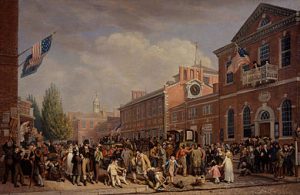The Unanswered Question
The Unanswered Question is probably Charles Ives‘ most famous composition. It’s equally a philosophical statement as it is a work of art. While that may sound simple, I think it’s actually quite a compositional feat. Ives has written a remarkably transparent composition that clearly conveys his philosophical idea. Compare this piece to Strauss‘ Also Sprach Zarathustra, written only a decade before, which merely paints the mood of Nietzsche‘s book, and fails to put forth a logical argument or statement of any kind. Meanwhile, Ives’ work is perfectly clear.***
[SPOILER ALERT – skip this paragraph and listen to the piece if you want to hear it for yourself. If you want some hints, read on.] Three instrumental voices create the musical landscape. The strings, representing eternity, play slow, beautiful music. The lone trumpet asks its question: “what is the meaning of existence?” Dissonant winds provide the answer, which does not satisfy. The question is asked again and again, and the answer becomes more complicated, but never satisfactory. In the end, two things remain: the question, and eternity.
*** That is to say, I believe the meaning of the music is clear as long as the audience knows the title of the piece. If a person heard this work without knowing the title, there is a chance s/he might understand the deeper meaning, but it’s certainly less likely.


Recent Comments